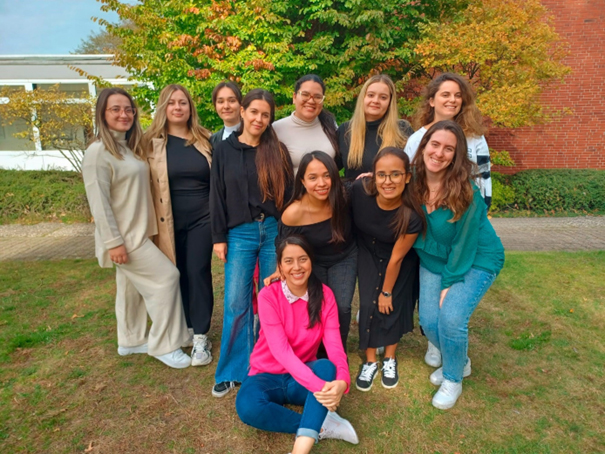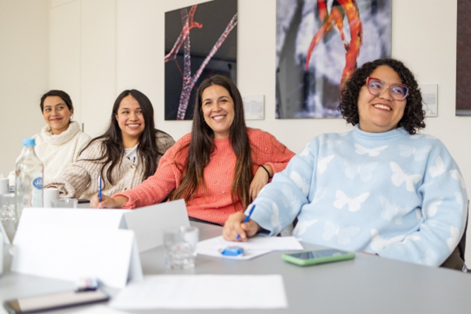Mentoring, Buddy program and tandem – the advantage of personal support in a work setting
Whether mentoring, sponsorship, or tandem – personal contacts, supporters, and advocates are an important resource for many in their new work and living environment and help them find their feet. These personnel development tools are particularly useful in the context of international recruitment of nursing professionals. However, it is important to bear in mind that this form of support also takes time and is often challenging. Therefore, contact persons should be at least partially exempt from other duties for this role and, depending on what the support entails, be well prepared. It is also worthwhile to give the contact persons space to exchange ideas with each other, as each of them brings different expertise, experience, and knowledge to the table, thus creating a network within the institution.
All three models are often used synonymously. Nevertheless, it is worth knowing at least the different perspectives and implications:
Tandem
The tandem is known as a language-learning method in which two native speakers teach each other their own language.
As internationally recruited nurses want and should continuously expand their German language level for professional practice in Germany, helpful and committed team members are a great asset. They play an important role with regard to the (specialist) language acquisition of internationally recruited nurses. However, tandems can also be formed for leisure activities outside working hours.
Buddy Models
Buddy models are useful during the induction training phase for new employees. Ideally the sponsors who are doing the induction training are in the same team as the new employee and at the same hierarchy level as the new nurse. The Buddy take on this task voluntarily and accompanies the new colleague from the first working day for at least six months – longer if necessary. The Buddy shows and explains the formal procedures and processes at the respective workplace and, where possible in the entire company. They help to integrate the new employee in the team and clarify informal rules.
Mentoring
This is about a relationship between a mentor and a mentee, and their connection back to the official mentoring programme. A mentoring programme focuses on certain topics. The mentors are prepared accordingly and the programme receives professional support. The benefits of a mentoring programme are not primarily meant to be for introducing and supporting everyday tasks. Rather, a mentor agrees to enter into a confidential and understanding dialogue with the mentee. This can involve topics that go beyond the usual dialogue between colleagues. In a mentoring programme for internationally recruited nurses, cultural, religious or ethnically understood differences may also be addressed.
Cultural ambassadors at Münster University Hospital (UKM)
 Building bridges
Building bridges
Münster University Hospital (UKM) has launched the “Cultural Ambassadors” project to make it easier for internationally recruited nurses to settle in and integrate in Germany. Cultural ambassadors, who are themselves internationally recruited nurses, act as a link between the new colleagues, the ward teams and the UKM integration team. Through their own experiences, they bring valuable perspectives that can help all employees to understand cultural differences and promote respectful cooperation. However, this role is part of a joint process in which everyone in the team contributes to breaking down cultural barriers and creating an inclusive working environment.
Goals and vision of the project
The project aims to foster a connection between new employees and the ward teams by taking cultural differences into account and focusing on exchange, collaboration and mutual support. This creates a respectful and inclusive working environment in which all team members, regardless of their background, can work well together.
Goals:
- Sensitizing ward teams to cultural differences.
- Supporting internationally recruited nursing staff in their integration.
- Promoting respectful and appreciative interaction in everyday working life.
Tasks and role of cultural ambassadors
Integration and Onboarding:
- Supporting the integration team in onboarding new colleagues
- Being in contact right from the start: Support in the country of origin via video messages
- Cultural mediation: Cultural ambassadors are available to the ward teams and new employees as direct contacts for questions and problems
- Course sponsorships: Support for new colleagues throughout their entire period of professional recognition
- Practical visits: Regular visits to the wards to ensure direct and continuous support
- Professional context: Providing information about nursing training and the understanding of nursing in the new colleagues’ countries of origin
Limits of support: The cultural ambassadors themselves determine the limits of their support and work in close coordination with the UKM integration team to avoid overburdening them.
Preparation and support for the cultural ambassadors
Vorbereitungsworkshop: The cultural ambassadors take part in a one-week workshop conducted by lecturers from the Institute of Ethnology at the University of Münster.
Contents include:
- Reflection on own and foreign cultures.
- Dealing with cultural misunderstandings and prejudices.
- Strategies for coping with culture shock and experiences of discrimination.
Continuous support
Cultural ambassadors never act alone. They work closely with the integration team and the ward teams and receive support through supervision, training and follow-up coaching in dealing with team conflicts and in sharpening their profile.
Recruitment and motivation of cultural ambassadors
Advertising and selection:
- An internal promotional video and a comprehensive website draw attention to the project.
- Interested parties can apply via a project-related email address.
- Direct contact is made via managers and the integration team.
Time commitment: Cultural ambassadors are released from work for planned project days and receive support with flexible offers such as onboarding and individual support. This time is recorded as regular working hours and no additional remuneration is paid.
Dealing with challenges: Conflicts and discrimination
Conflict management: When confronted with conflicts or accusations of discrimination, the integration team is on hand to advise the cultural ambassadors. There is also an overarching reporting portal to ensure hospital safety and to report cases of discrimination.
Involving and expanding the skills of the entire team
All members of the nursing team have the opportunity to take part in further training on intercultural competence. Joint events, such as an intercultural dance workshop, promote cooperation and help to overcome language barriers.
Conclusion

The “Cultural Ambassadors” project at the UKM supports the integration of internationally recruited nursing staff by providing practical assistance and strengthening the exchange within the team. The cultural ambassadors use their own experiences to help new colleagues find their feet and promote cooperation in everyday clinical practice.
Contact persons for the project:
Angelika Maase, M.Sc. (Leitung Geschäftsbereich Pflegeentwicklung Universitätsklinikum Münster)
angelika.maase@ukmuenster.de
Simon Hake B.A. (Integrationsmanager Abteilung internationale Pflegefachkräfte Universitätsklinikum Münster)
simon.hake@ukmuenster.de
Nadja Lebioda M.A. (Berufspädagogin Abteilung internationale Pflegefachkräfte Universitätsklinikum Münster) nadja.lebioda@ukmuenster.de
STaF – Social Participation of Foreign Nursing Professionals
Mentoring Program for Newly Immigrated Nurses in Baden-Württemberg and North Rhine-Westphalia

The STaF project of the Development Work for Social Education and Innovation, Baden-Württemberg State Association e.V., is aimed at hospitals, nursing homes, and outpatient services that employ foreign nurses and trainees (mentees), as well as committed citizens who want to contribute to the social integration of nursing professionals on site as mentors.
The integration of nursing professionals from abroad proves to be complex. Decisive for success is not only the professional and operational integration but also the social integration. Linguistic uncertainties and high expectations at the workplace, as well as a lack of opportunities, can lead newly immigrated nursing professionals to remain among themselves and have little contact with locals.
A mentor-mentee relationship can be helpful in supporting social integration on site. The goal is to create opportunities for encounters between locals and newly immigrated nursing staff, thereby supporting operational integration through integration into the local community. Additionally, there is the opportunity to train language skills and engage in a mutual exchange of ideas about living and working in Germany.
Further information and registration options as an employer, mentor, or mentee can be found here:
STaF – Mentoringprogramm für ausländische Pflegefachpersonen
Mentoring & co. must also be interlinked
No matter which model of personal support a company would like to use, it should definitely be combined with aspects of the other models. Other operational integration-promoting measures should also be incorporated into the model.
It is important to note here that there are two other jobs that are closely involved with the newly recruited nurses:
-
- Integration management
Via integration management – as a control centre for the entire project – the recruitment has already been processed. The employee who takes over the integration management can in smaller companies of course also be the mentor for example. In larger companies or if several internationally recruited nurses are new in the company, the job of integration management will be different from the job of sponsorship or mentoring. - Practice instructor
Depending on the deficit assessment and the agreed compensation measure, practice instructors can be important contact persons for the recruited nurses in the first months after arrival in Germany.
Of course, having five personal contact persons will make the situation confusing for everyone. The role of the host company is therefore to find good solutions for all parties involved, because as yet there are no standardised and proven constellations or universal solutions that suit every company.
- Integration management
Think conceptually about your personal support model for new employees.
The most important things for your to-do list
Skilful mentoring requires innovative thinking as well as individual approaches and solutions on your part.
As an internationally recruiting company, it is up to you to create an attractive workplace for nurses from all over the world, which is safe and underpinned by tolerance and mutual goodwill.
An ideal situation is to train one employee from the existing team as a welcome mentor for each internationally recruited employee. However, one mentor should have to support a maximum of five mentees
It is important to have a clear understanding of the cooperation between the integration management department and the welcome mentors.
A mentor should definitely be given enough time to provide a good level of support


Follow us: